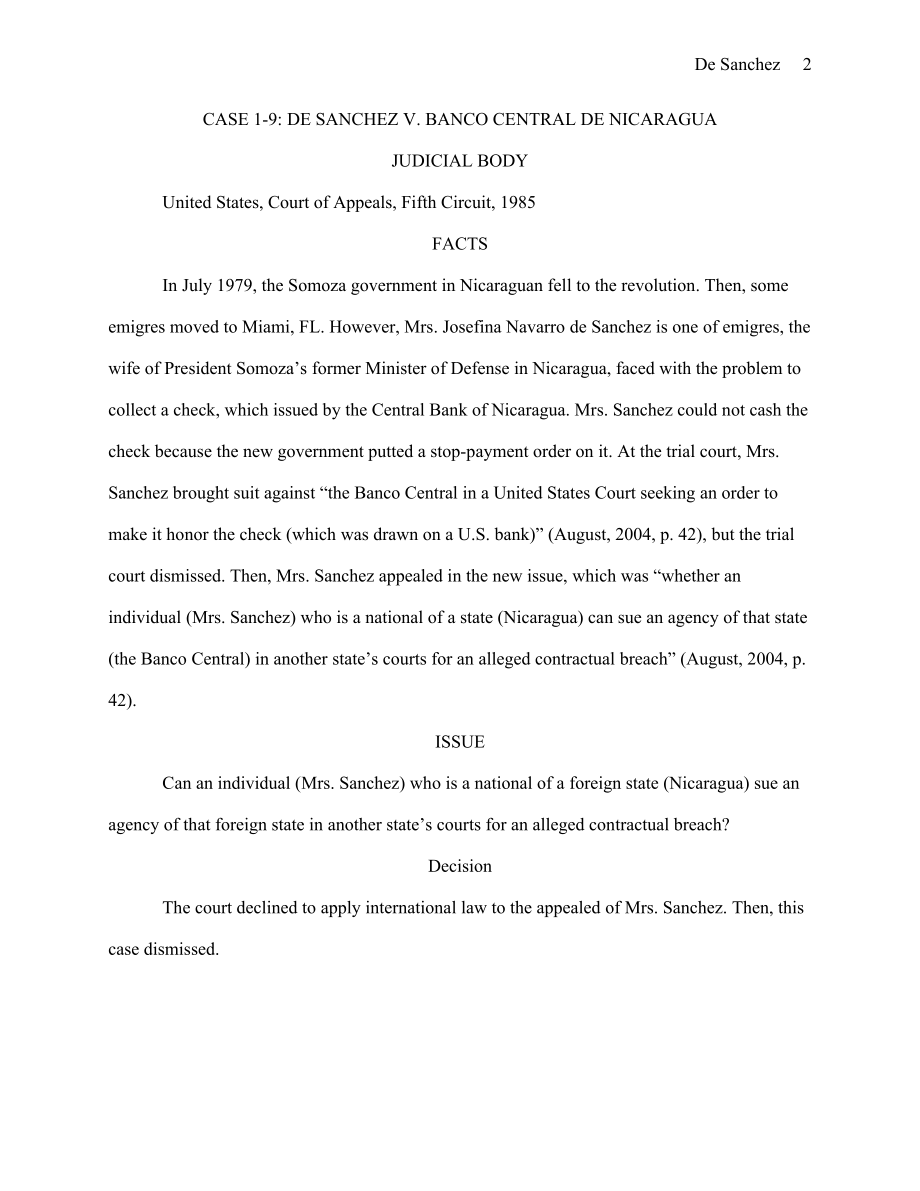 Case 19 De Sanchez V
Case 19 De Sanchez V



《Case 19 De Sanchez V》由会员分享,可在线阅读,更多相关《Case 19 De Sanchez V(4页珍藏版)》请在装配图网上搜索。
1、De Sanchez 5CASE 1-9: DE SANCHEZ V. BANCO CENTRAL DE NICARAGUAJUDICIAL BODYUnited States, Court of Appeals, Fifth Circuit, 1985FACTSIn July 1979, the Somoza government in Nicaraguan fell to the revolution. Then, some emigres moved to Miami, FL. However, Mrs. Josefina Navarro de Sanchez is one of emi
2、gres, the wife of President Somozas former Minister of Defense in Nicaragua, faced with the problem to collect a check, which issued by the Central Bank of Nicaragua. Mrs. Sanchez could not cash the check because the new government putted a stop-payment order on it. At the trial court, Mrs. Sanchez
3、brought suit against “the Banco Central in a United States Court seeking an order to make it honor the check (which was drawn on a U.S. bank)” (August, 2004, p. 42), but the trial court dismissed. Then, Mrs. Sanchez appealed in the new issue, which was “whether an individual (Mrs. Sanchez) who is a
4、national of a state (Nicaragua) can sue an agency of that state (the Banco Central) in another states courts for an alleged contractual breach” (August, 2004, p. 42).ISSUECan an individual (Mrs. Sanchez) who is a national of a foreign state (Nicaragua) sue an agency of that foreign state in another
5、states courts for an alleged contractual breach?DecisionThe court declined to apply international law to the appealed of Mrs. Sanchez. Then, this case dismissed. RATIONALThe international law concern on individuals in two ways: 1) international law ignores individuals or 2) international law treats
6、individuals as subjects. First, in term of the traditional law of state responsibility, individuals have “no direct rights” (August, 2004, p. 41). The state of individuals national can seek “redress on the behalf of that individual from any foreign state that cause the individual injury” (August, 20
7、04, p. 41), which the term of liability of any foreign state calls state responsibility. However, there are some limitations, which individuals cannot pursue their own claims, or individuals cannot protest the actions of their own national state. Second, international law treats individuals as subje
8、cts, which regards individuals to have the basic human rights and “the right to asset claims on their own behalf against states, including the state of their nationality” (August, 2004, p. 41). However, the kinds of claims of international human rights law are limited, such as “the rights not to be
9、murdered, tortured, or other cruel, inhuman, or degrading punishment; the right not to be a slave; and the right not to be arbitrarily detained” (August, 2004, p. 43). In this case, in term of the traditional law of state responsibility, because the injury was the individuals injury in her own state
10、, then, the court showed the reason that “as long as a nation injures only its own nationals, however, then, no other states interest is involved; the injury is a purely domestic affair, to be resolved with in the confines of the nation itself” (August, 2004, p. 42-43).In term of international human
11、 rights law, this case did not contravene the international human rights law because government expropriation did not contravene the minimum standard of human rights, such as “the rights not to be murdered, tortured, or other cruel, inhuman, or degrading punishment; the right not to be a slave; and
12、the right not to be arbitrarily detained” (August, 2004, p. 43). In addition, another case, which the court applied on this case, was Jafari v. Islamic Republic of Iran, 539 F.Supp. 209 (D.C. Ill., 1982), which “it may be foreign to our way of life and thought, but the fact is that governmental expr
13、opriation is not so universally abhorred that its prohibition commands the general assent of civilized nations” (August, 2004, p. 44). As the result, this doctrine shows that one state will not inquire into the internal affairs of another state, otherwise there might be no internal matter, which wou
14、ld not be immune from foreign scrutiny. RELEVANCYThis case shows the international business practices to learn more about the differences between the traditional law of state responsibility and the international human rights law. In addition, this case can tell the situation, which the plaintiffs ca
15、n and cannot sue their own state under the international human rights law. In addition, this case tells the limitations of individuals to sue their own state under the traditional law of state responsibility. REFERENCEAugust, Ray (2004). International business law: Text, cases, and readings (4th ed.). New Jersey: Prentice Hall.
- 温馨提示:
1: 本站所有资源如无特殊说明,都需要本地电脑安装OFFICE2007和PDF阅读器。图纸软件为CAD,CAXA,PROE,UG,SolidWorks等.压缩文件请下载最新的WinRAR软件解压。
2: 本站的文档不包含任何第三方提供的附件图纸等,如果需要附件,请联系上传者。文件的所有权益归上传用户所有。
3.本站RAR压缩包中若带图纸,网页内容里面会有图纸预览,若没有图纸预览就没有图纸。
4. 未经权益所有人同意不得将文件中的内容挪作商业或盈利用途。
5. 装配图网仅提供信息存储空间,仅对用户上传内容的表现方式做保护处理,对用户上传分享的文档内容本身不做任何修改或编辑,并不能对任何下载内容负责。
6. 下载文件中如有侵权或不适当内容,请与我们联系,我们立即纠正。
7. 本站不保证下载资源的准确性、安全性和完整性, 同时也不承担用户因使用这些下载资源对自己和他人造成任何形式的伤害或损失。
